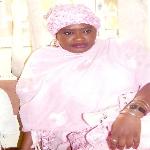Shiek Aminu Daurawa is commander at Kano State Hisba board, which enforces Islamic law in the state. His organization works with the group called the Voice of Widows, Divorcees and Orphans of Nigeria, or VOWAN to find potential husbands.
Daurwawa said the process is relatively simple: any man who wants to marry any of the divorcees will have to fill out a form stating his name, age, state of origin, occupation, and marital status. He will also need to state where he stays, the number of children, if any, his health status, the complexion and overall appearance of the divorcee, and reasons for wanting to marry.
The form requires a passport photo, and the signature of three witnesses, one of whom must be the head of a neighborhood ward. They must attest to the applicant's good conduct and his ability to support a family.
Daurawa said if there is a match, the couple will arrange to meet each other and to discuss issues of mutual interest.

VOWAN
A divorcee trained as a tailor receives a sewing machine as a gift from the Directorate of Employment in Kano. (photo courtesy of VOWAN)If they want to go ahead and marry, they will inform marriage counsellors at the board and assure them in writing that the decision was made without undue influence or duress.
He said this is so because in Islam there is no compulsion in marriage for either the man or woman.
Daurawa said after the board grants its approval, the couple will choose the date and place they'll be married, which could include the mosque or even the Hisba board.
After the marriage, the Hisba board will visit their home every three months to find out how the couple are faring and give advice when necessary.
Daurawa said the board is also working to set rules that make divorce difficult. For instance, if a couple has children and the husband calls for a legal end to the marriage, he may have to vacate the house and pay a large monthly alimony.
Hisba and its partner VOWAN – the Voice of Widows, Divorcees and Orphans of Nigeria -- see the project as a success.
But it's not the only effort sponsored by the women's group to improve the lives of Muslim women in the region.
Today, VOWAN's executive director Hajia Atine Abdullahi Abdullahi is in her office along busy Maiduguri road in Kano State's Tarauni Local Government area.
A large number of women have come to seek assistance in one form or the other.

VOWAN
VOWAN's president Atine Abdullahi (photo courtesy of VOWAN)She said women have many problems, the most important of which is a lack of education. As a result, if they get divorced, they have hardly any skills to earn a living. She says women have been relegated to the background in northen Nigeria for a long time now.
Abdullahi said that's why she formed the association, which started in a mosque during the 2003 Ramadan [fasting] period.
Presently, the it has over 800,000 registered members in Kano State.
She said her group partners with the Directorate of Employment to offer skills training to the women. They can choose to learn a number of trades, including hair dressing, tailoring and knitting, interior decoration, video coverage, and carpentry.
Abdullahi said over 500 members have graduated from such vocational training programs and have set up their own small scale businesses from credit facilities provided by the effort.
Mallama Khadija Sani is mother of two and a divorcee. She lives in Ungwa Uku section of Tarauni local Government Area of Kano with her children.
Khadija said she registered and was trained as a hairdresser. After the training, she got a loan of N150,000;00--about $1000 US--to start a hair salon.
The business is paying her bills and she is living comfortably, but she still wants to marry again.
Atine Abdullahi said Khadija's issue and that for many other divorcees is a big concern. Marriage seems to have been neglected. Divorce is on the increase. She said men just divorce their wife or wives, leaving them with children and not worrying about how she will care for them. Divorcees are left with the burden of raising the children and are totally neglected by their ex-husbands.
Many husbands do not pay alimony. As a result, many single-parent homes headed by divorced women barely make ends meet. She said the situation makes it hard for many women to raise children, who without adequate support or parental supervision, risk becoming – as she puts it – miscreants or prostitutes in an effort to survive.
According to the Inter-Press Service, a study conducted by Kano State's attorney general in 2006 Kano State's justice ministry found that over 80 percent of marriages in the state were not stable.
The report attributed the problem in part to a failure of the couple to communicate and the failure of husbands to allow their wives to finish their education.
